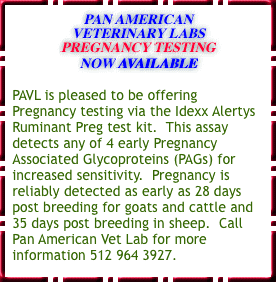August 2023 Issue |
||||||||
 |
||||||||
• Subscribe to Meat Goat Mania • Email Us • Onion Creek Ranch • Bending Tree Ranch • OCR Health & Management Articles • MGM Archive |
||||||||
PROLAPSES A prolapse is the displacement of part or all of an organ of the body from its normal position, usually downward or outward, resulting in its protruding from an orifice. Prolapses occur in both female and male goats. Females can prolapse either their rectum or their vagina. Males can prolapse their rectum. Rectal prolapses may occur in goats that are too fat, but they can also be the result of prolonged coughing. Vaginal prolapses usually occur when the doe is very heavy with kids. Return the prolapsed organ to its original position inside the goat's body in the following manner: Mix one-half gallon of warm water with an antibacterial product such as Chlorhexidine, Nolvasan, or Betadine solution. If these products are not available, use warm water only. After donning disposable gloves, stand the goat up on all four legs and gently pour the warm water solution over the entire surface of the prolapse, cleansing it of dirt and debris. Using a canister of white granulated sugar, shake it over the surface of the prolapse. In a few minutes' time, the sugar will begin to remove moisture from the prolapse, shrinking it to make it easier to reposition inside the goat's body. An iodine solution can be used if sugar is not available. Using your gloved hands, carefully and gently squeeze the remaining moisture out of the prolapse and begin pushing it back inside the goat. Use the flat palm of your hand as much as possible. This delicate tissue is easy to tear and repair is difficult. Care must be taken not to damage it. If the prolapse won't go back inside the body, gently lay the goat on its side and try again. Once the prolapse is back inside the goat's body, use your finger to push it back into its normal position inside the goat. Using a gloved hand, apply Preparation H or generic equivalent topically three times a day to the vaginal or rectal area to reduce swelling and irritation. To minimize the chance of infection, administer penicillin subcutaneously (SQ) for 5 consecutive days at a dosage rate of 5 cc's per 100 pounds bodyweight. Occasionally a rectal prolapse will re-occur. Repeat this procedure and it should remain inside the animal. If coughing has caused the prolapse, dose the goat twice daily with Expectahist, an oral antihistamine/decongestant, until coughing stops. Robitussin DM can also be used. Sometimes the prolapse is so swollen that a veterinarian's help is required. Years ago I took a yearling doe with a rectal prolapse to the vet. Because the doe would not quit pushing outward as the vet tried to reposition the rectal prolapse inside, he administered a nerve-blocking injectable sedative above the tail at the base of her spine to relax the muscles until he could get the tissue back inside her. Then he placed a pursestring stitch in the opening, with instructions to remove it in four (4) days and adjust it if necessary to allow goat pills to pass out of her body. The doe was given Dexamethazone for two days to help reduce swelling (she was not pregnant . . .Dex induces labor in pregnant does) and I gave her the antibiotic Excenel RTU for 5 consecutive days. Vaginal prolapses may require sutures to keep the organ inside the pregnant doe's body, since growing kids in the expanding uterus are pushing on her cervix and into her vagina. If this is necessary, you must be present when the doe's water breaks, because the sutures will have to be cut in order for her to give birth. If you have a goat who has had repeated instances of prolapses and you are not overfeeding it, then you should consider culling it from your herd. Suzanne W. Gasparotto, ONION CREEK RANCH, Texas 8.1.23 |
Subscribe FREE now! Monthly issues with new articles and other educational information on meat goat health, nutrition, and management written by Suzanne W. Gasparotto of Onion Creek Ranch and Pat Cotten of Bending Tree Ranch. In all cases, it is your responsibility to obtain veterinary services and advice before using any of the information provided in these articles. Neither Suzanne Gasparotto nor Pat Cotten are veterinarians. None of the contributors to this website will be held responsible for the use of any information contained herein. |
|||||||||||||||||||||||||||
|
||||||||||||||||||||||||||||
 |
||||||||||||||||||||||||||||
 |
||||||||||||||||||||||||||||
 |
||||||||||||||||||||||||||||
Taking reservations for GoatCamp™ 2023 FAMACHA training. The GOATCAMP™ Instructors DR. MARK SWENING, DVM - VETERINARIAN, Coleman, Texas Vet Clinic Classroom Instruction as well as Hands-on Work with Onion Creek Ranch goats on a working goat ranch TUITION PER STUDENT - $550.00 IF RECEIVED BEFORE 10-1-23 $575.00 IF RECEIVED ON OR AFTER 10-1-23 Registration Form on the GoatCamp™page at www.tennesseemeatgoats.com Additional Information or questions: Suzanne Gasparotto - 512-265-2090 (Texas) or email her at onioncreek@tennesseemeatgoats.com. Quicker response if you do NOT contact through website or Facebook. |
||
 |
||
|
||||||||||||||||||||||||||||||||||||||||||||||||||||||||||||||||||||||||||||||||||||||||||||||||||||||||||||||||||||||||||||||||||||||||
|
||
|
||||||||||||||||||||||||||||||||||||||||||||||||||||









